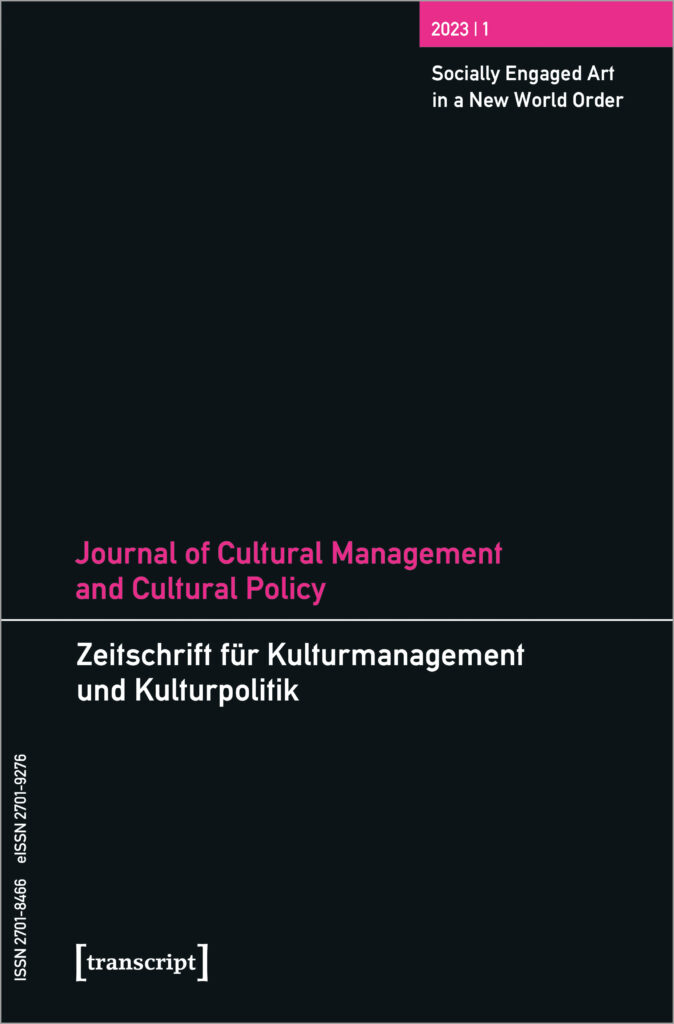Research Article
The Influence of Political Engagement on Artistic Reputation. Self-Evaluations of Artists
Abstract
Despite the study of political art by many scholars, an in-depth analysis of how artists express themselves politically and assess their political expression as part of their artistic reputation is still missing. How do artists value their political action in view of their artistic reputation, and why? A promising theoretical entry to this question is Pierre Bourdieu’s field theory. We used his concept of field-specific symbolic capital in cultural production to study political expression by artists; findings are based on empirical research in the cities of Hamburg, Hanover, Jerusalem and Tel Aviv. In previous publications of this multi-stage research project, we identified five artist types that are involved in urban political action in different ways—the autonomous artist, social artivist, political artist, political artivist and high status artist. In this stage, we assess their political behavior as a factor of symbolic capital. We found that autonomous artists reject political action as detrimental to their symbolic capital. High status artists have such a high artistic position that they can ignore any possible damage to their reputation caused by their political activities. Social artivists believe that overt political action might be harmful for their symbolic capital, and we label their political artistic action as social art. Political artists declare that their artwork is political, which promotes their symbolic capital as long as their political expressions are restricted to their artwork and not seen as personal expressions. Political artivists do not draw a line between their artwork and personal political expression, as they understand both as reputation enhancing. We thus reject the negative correlation between artistic autonomy and political heteronomy in the art field as simplistic.
Keywords
2023 (1)
Socially Engaged Art in a New World Order

Related Articles
Journal of Cultural Management and Cultural Policy
Research Article
© 2026, Journal of Cultural Management and Cultural Policy
Keywords
- Aesthetics
- Higher Education
- Cultural Diplomacy and Foreign Cultural Policy
- Occupation
- Career and Professional Role
- Audience Development
- Audience Studies and Visitor Studies
- Visitor Motivations
- Business
- Covid Pandemic
- Democracy
- Digitalization
- Diversity
- Third Sector
- Empirical Aesthetics
- Development
- Ethics
- Evaluation
- Field Theory
- Festival
- Film
- Federalism
- Community Arts
- Societal Change
- Ideology
- Staging
- Career
- Communication
- Concert
- Creative Industries
- Creativity
- Crisis
- Culture
- arts organizations, cultural organizations
- Cultural Participation
- Cultural Change
- Fincancing The Arts
- Cultural Promotion Law
- Cultural History
- Cultural Management
- Cultural Economy
- Cultural Organizations
- Art Education
- Cultural Policy
- Cultural Production
- Cultural Sociology
- Art Education
- Cultural Understanding
- Arts Administration
- Cultural Industry
- Cultural Sciences
- Art
- Art Field
- Arts Research
- Artists
- Artistic Research
- Artistic Reputation
- Arts Management
- Arts Organizations
- Art education
- Arts Marketing
- Arts Administration
- Curating
- Leadership
- Literature
- Advocacy
- Management
- Marketing
- Market
- Media
- Methods Development
- Mexico
- Monumentalizing
- Museum
- Music
- Non-Visitor Studies
- Opera
- Orchestra
- Organization
- Political Expression
- Post-truth Politics
- Professional Role
- Audience
- Audience Development
- Law
- Government
- Role
- Socially Engaged Art
- Social Cohesion
- Social Change
- Social Cohesion
- Non-visitor Socio-demographics
- Socioculture
- State
- Symbolic capital
- Dance
- Participatory Justice
- Theatre
- Theatre Governance
- Theory Development
- Tourism
- Transformation
- Survey
- Entrepreneurship
- Urbanism
- Civil Society


